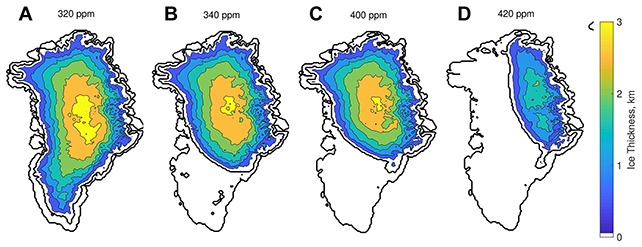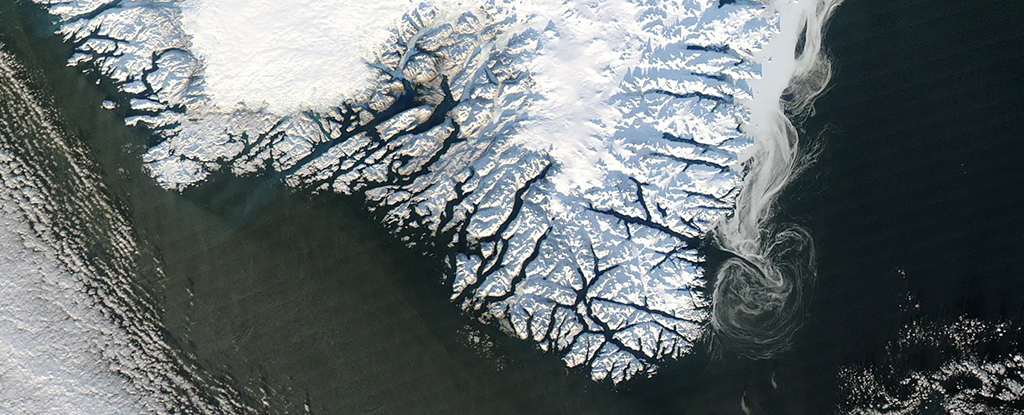Scientists are increasingly worried about climate tipping points, where certain thresholds are reached that drive further warming. It's almost like a runaway train heading off a cliff – we're getting near the point where it's too late to put the brakes on.
A new study identifies two of these tipping points in relation to the Greenland ice sheet (GIS), a 1.7-million-square-kilometer (660,200-square-mile) frozen expanse that's the second largest body of ice in the world after the Antarctic ice sheet.
Based on the latest models, releasing 1,000 gigatons of carbon into the atmosphere will completely melt the southern region of the ice sheet. Go up to 2,500 gigatons, and almost the entire ice sheet would be wiped away permanently.

As CO2 levels go up, the ice goes down. (Höning et al., Geophysical Research Letters, 2023)
Since human activities started having a noticeable impact on carbon emissions, we've already put 500 gigatons of carbon into the atmosphere – so we're already halfway to losing a large chunk of the GIS.
"The first tipping point is not far from today's climate conditions, so we're in danger of crossing it," says climate scientist Dennis Höning from the Potsdam Institute for Climate Impact Research in Germany.
"Once we start sliding, we will fall off this cliff and cannot climb back up."
The complex simulation used by the research team factored in all the key climate processes, and the factors that influence ice melt, including air temperature, water temperature, ocean current activity, and precipitation levels.
These are complex models to run because the variables change all the time. As the ice sheet melts, it sinks, which in turn exposes it to warmer air at lower altitudes, which further impacts the melting rate.
The study suggests that even sticking to the 1.5 °C (2.7 °F) temperature rise above pre-industrial levels mandated in the Paris climate agreement won't be enough to stop the GIS from going past the point where it can't fully recover.
We're looking at a long-term sea level rise of 1.8 meters (5.9 feet) with 1,000 gigatons of carbon pumped into the atmosphere and a huge 6.9 meter (22.6 feet) rise with 2,500 gigatons of carbon, the researchers report.
Sadly, we're showing no signs of slowing down.
"Most of the ice sheet melting won't occur in the next decade, but it won't be too long before we will not be able to work against it anymore," says Höning.
Between 2003 and 2016, we've already seen about 255 gigatons of ice lost from the GIS every year. In fact, a recent study suggested that ice melt in Greenland has been happening more rapidly than previously thought.
That, in turn, leads to sea level rise and a host of other issues. For example, the less ice coverage there is, the less sunlight gets reflected back into space, which means temperature rises accelerate even further.
The study is the latest in a long line of stark reminders that drastic action must be taken quickly to put the brakes on runaway climate change and global warming. Otherwise, the Greenland ice sheet won't be all we lose.
"We cannot continue carbon emissions at the same rate for much longer without risking crossing the tipping points," says Höning.
The research has been published in Geophysical Research Letters.
- aum
-

 1
1




Recommended Comments
There are no comments to display.
Join the conversation
You can post now and register later. If you have an account, sign in now to post with your account.
Note: Your post will require moderator approval before it will be visible.